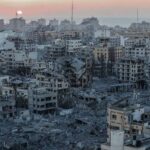On January 26, the International Criminal Court (ICC) issued a landmark decision regarding the ongoing conflict in Gaza. This ruling, while acknowledging the severity of the situation, did not extend to ordering a halt to the attacks but rather emphasized adherence to international laws pertaining to genocide and war crimes. This decision has profound implications, especially for the Tamil community in Sri Lanka, who have been promised justice and intervention by international courts by their so-called politicians.
The ICC’s ruling reflects the complex dynamics of international law and politics. It subtly suggests that the resolution of internal conflicts is often expected to come from within the nation rather than through international intervention. This point is crucial, particularly in the context of Sri Lanka’s internal ethnic conflict. The court’s reluctance to directly intervene in the Gaza conflict, despite the apparent humanitarian crisis, underscores the limitations of international bodies like the United Nations and the ICC in addressing civilian casualties and resolving internal disputes.
For the Tamil community in Sri Lanka, this ruling is a stark reminder of the realities of international politics and law. It casts doubt on the promises made by some Tamil nationalist politicians, who have long assured their constituents of securing justice through international legal avenues. The ICC’s decision in the Gaza case suggests that such assurances might be overly optimistic, if not entirely misleading. This realization is sobering for the Tamil community, which has endured long- standing conflict.
Moreover, the ICC’s stance in the Gaza case serves as an indirect message to other communities in similar situations. It highlights the importance of internal dialogue and negotiations with national governments to address grievances. The Sri Lankan Tamil community’s reliance on international courts for justice might need to be reevaluated in light of these revelations.
PLEASE NOTE THAT THE OPINIONS EXPRESSED IN THIS ARTICLE ARE SOLELY THOSE OF THE AUTHOR AND DO NOT NECESSARILY REFLECT THE VIEWS OF THE JAFFNA MONITOR


